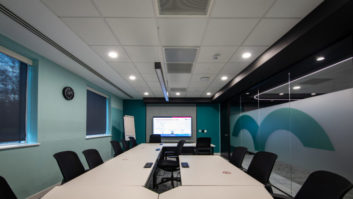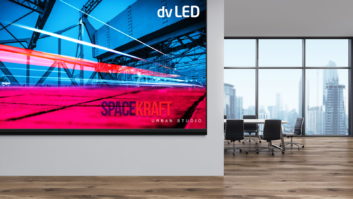What can a well-presented showroom bring to a custom installer’s business? Anthony Clarke investigates
Showrooms are a common feature of the automotive market, where the power of experience is a well-known aid to selling.
Kitchen and bathroom installers have also adopted the showroom ñ or in same cases, the show house ñ as a route to market. However, the CI industry has been slower to realise the benefits of creating dedicated display space, an oversight that is now starting to be addressed.
Carlo Natale, president and CEO of Domotica Pi˘, a CI consultancy and home automation specialist based in Vigevano, Italy, thinks that being able to demonstrate a product or system is a vital part of the business.
ìCan a well-designed showroom help a manufacturer or distributor better explain the features and benefits of a product? Absolutely yes, but you need to distinguish between the roles and the targets of manufacturers, distributors and system integrators.
ìI believe that any specialised system integrator or professional installer will agree on the fact that if a customer can touch with his own hands and see the benefits of the application in which they are interested, he will immediately confirm the sale. I also believe that manufacturers should help distributors to better demonstrate their product lines. This will result in better and more professional partners to broaden the manufacturerís message,î says Natale.
ìIn simple terms that means that there is a need for different types of showrooms for different target markets: manufacturers and their distributors need ones dedicated to their installer professionals, and these professionals in turn need showrooms for their final customers,î adds Natale, who opened his latest show house in southern Milan in November.
Fraser Stride, marketing director of Finite Solutions, an integration company based in Yorkshire, England, agrees with Natale. His companyís first show apartment was so successful that the decision was made to create a top of the line show home.
ìOriginally we had a show apartment in Leeds city centre. It probably had around £30,000-worth of equipment installed in it, such as a drop down projector screen and some multi-room audio,î he explains.
ìWe found that if we got customers through the door they were much more likely to make a purchase with us, rather than go somewhere else, because the apartment gave us the opportunity to build up their confidence in what we could offer. What we also found was that if we let customers play with the equipment then theyíd spend a lot more money.
ìIt wasnít a pushy up-sell,î continues Stride. ìAll we had to say was ëthis is what you can doí and the response was generally ëweíd never even thought of thatí. And because the apartment was all laid out in a very nice way, and looked good, it meant that when someone brought their partner around, whoever it was that was leading the purchase didnít need to try so hard and convincing the wife or husband that it was a good idea.î
Up-selling and down-selling
There was, however, a problem with the apartment ñ the level of the equipment that could be installed. ìWe were up-selling some customers from, say, a £10k budget to a £25k spend but the problem was that if people had more than a £50k budget, we were reluctant to take them there because there was actually a risk of down selling,î Stride explains.
Despite its drawbacks, the apartment was working really well for Finite Solutions, so the decision was made to repeat the idea with a grander vision. ìWe thought, letís do it on a much larger scale so that we can demonstrate for a variety of different pockets and win over customers with larger budgets,î says Stride.
ìThe conclusion that we came to was that we needed to go big but given the type of customer base that we wanted to appeal to it needed to be somewhere that was grand as well.
ìOne of the benefits of being up in Yorkshire is that propertyís a bit cheaper than it is down south and so we able to buy a very grand house, albeit one in need of a lot of renovation work,î adds Stride. ìIn the end we installed around £300,000-worth of kit ñ every roomís got some kind of cool technology in it.î
Some 170 miles south of Leeds in Bishops Stortford, Armour Home has just completed a refit of its HQ showroom. ìWeíve just gutted the place and put in a whole bunch of new products. It now looks a lot nicer and a lot brighter than before,î confirms the companyís PR manager Steve Reichert, who explained that the facility serves four core functions.
ìOne is purely as a showpiece that lets visitors see that weíre a pretty serious player with many more brands than theyíd previously thought. The second use is for us to sell products to installers. Third, we use it for our own staff for product training and how it all goes together. And lastly, we are perfectly happy for our customers ñ the installers ñ to bring their clients in, because quite a lot of installers canít demonstrate everything.
ìIncreasing numbers do have a showroom or a demonstration area but they canít present it all,î Reichert qualifies. ìBack in the day, a lot were working from home or small industrial units, which were storerooms plus offices and even now space can be limited. I donít really want to encourage it but we can open at a weekend if a customer canít make it at any other time.î
The showroom has an additional, unintentional, benefit, adds Reichert: ìMany people come here for training at the Armour Academy and they tend to walk through it several times a day, on their way to the breakout room where the lunches are held, or off for a cup of coffee. And while theyíre walking about quite a lot of stuff on show will catch someoneís eye. Hopefully, theyíll then ask about what theyíve seen.
ìHowever itís used, in the end it all boils down to us selling products,î Reichert affirms.
One of the companies that started life in someoneís home is Majik House, and MD Tim Burrow is happy to acknowledge the domestic nature of its origins. However, with a focus firmly on the future, Majik House has a sophisticated showroom ñ just a year old and the third base the company has had since its inception.
ìWe do very little advertising,î explains Burrow, ìas nearly everything we do is through referred work from an existing client. Weíve been in this market for 10 years now and weíve a lot of completed jobs out there and satisfied customers. Coupled with that, we do our own mail shots to clients, friends of clients and contacts that we know about, and we get these people in for events ñ musical evenings, film nights, etc.î
Hen nights as promotion
ìWe also offer the premises up for parties or for a group of girls to come and have a hen night. We have our own people and partners who will offer massages, facials ñ the sorts of things that will bring women in and want to use the venue. Weíve even got our own chef,î Burrow adds.
ìThese types of events promote us dramatically to areas where we normally wouldnít have contact because all those girls go home and tell their husbands and partners. And if weíre going to be promoting the showroom in that way itís got to be fitted with best equipment and be pristine.î
The facility is also used, daily, to show existing clients new products. ìItís turned out to be the most valuable sales tool weíve ever invested in,î claims Burrow. ìItís not the first showroom weíve had ñ that was my house. That was all done by appointment, a system we still use. The doorís never open and if someone comes along unannounced weíll turn them away and get them to book a time. We use that as the first filter ñ it weeds out people who arenít really interested.î
The current showroom combines lighting control ñ internal and external ñ and home entertainment integration. ìIt all works,î continues Burrow, ìthereís nothing here thatís static. And without a shadow of a doubt itís integrated control that really catches the imagination of our visitors.
ìWhen people walk though the door here, you can see their faces change ñ they obviously know itís not going to be cheap their eyes light up and itís then that you can tell if youíve got a sale. After that itís just down to how big the sale is going to be.î
Burrow is keen to stress the importance of the showroom as an aspirational sales environment. ìWe will always be able to show people more than what they can afford ñ youíve got to have it all or else you canít sell up. For example, weíve got cinema chairs in here which are £10,000 each and we sell very few of them but we do will sell derivatives of them.
ìWhat makes us different is that we try to encompass as much of the house as possible ñ we want to do that more than just sell a cinema systems,î he explains. ìThat way we can install systems that can be upgraded and when that becomes possible we invite a customer back to see us. This helps build sales and generate business. In fact, when clients are first in our showroom we start to talk to them about our continuing support for their systems, and itís at that point that weíll sell them a maintenance contract, which provides peace of mind.î
Experience and investment
Burrow says that the order books for 2009 are already looking very good: ìWeíve got more than weíve ever had and looking ahead to next years things have never been better.î
However, Natale warns that the size of an installerís business should dictate the scale of the showroom operation: ìThe competition between installers suggests that we should all be looking to develop showrooms and display space but only the most experienced professionals are likely to achieve a good return on the money.î
Stride isnít so sure: ìThe reason why the industry hasnít adopted showrooms more so is partly because of the cost of investment but also because the major players, in places such as London, have built their trade through referral and they donít therefore feel display space is necessary in order to sustain their business. Whereas if you look at some of the new players, if they want to build their business quickly then the showroom is an essential.
ìAll youíll need is a few companies taking this route to increasing market share and I think youíll see a lot of dealers follow suit.î
ìA showroom or show house will become an essential part of the business as itís simply not fair on the customer who is thinking of spending a few hundred thousand pounds if all you do is just show them some nice photos.î
And thereís an essential element to making the investment work, says Natale ñ staff. ìYou can often find ways to balance your showroom investment but you must have skilled and reliable staff to demonstrate it, otherwise youíll end up with a wonderful showroom without the skilled human input to make it work.
ìIn a time of recession it is worth investing to be prepared for when things swing back,î adds Natale. But the investment in a showroom isnít a one-off as Barrow explains: ìThe maximum life of that sort of facility is five years ñ no more. After that time youíll have to pull it to bits and freshen it up. In that respect itís no different to a house.î







